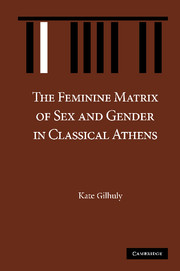Book contents
- Frontmatter
- Contents
- ACKNOWLEDGMENTS
- LIST OF ABBREVIATIONS
- 1 Introduction
- 2 Collapsing Order: Typologies of Women in the Speech “Against Neaira”
- 3 Why Is Diotima a Priestess? The Feminine Continuum in Plato's Symposium
- 4 Bringing the Polis Home: Private Performance and the Civic Gaze in Xenophon's Symposium
- 5 Sex and Sacrifice in Aristophanes' Lysistrata
- Conclusion
- BIBLIOGRAPHY
- INDEX LOCORUM
- SUBJECT INDEX
5 - Sex and Sacrifice in Aristophanes' Lysistrata
Published online by Cambridge University Press: 21 October 2009
- Frontmatter
- Contents
- ACKNOWLEDGMENTS
- LIST OF ABBREVIATIONS
- 1 Introduction
- 2 Collapsing Order: Typologies of Women in the Speech “Against Neaira”
- 3 Why Is Diotima a Priestess? The Feminine Continuum in Plato's Symposium
- 4 Bringing the Polis Home: Private Performance and the Civic Gaze in Xenophon's Symposium
- 5 Sex and Sacrifice in Aristophanes' Lysistrata
- Conclusion
- BIBLIOGRAPHY
- INDEX LOCORUM
- SUBJECT INDEX
Summary
INTRODUCTION
The previous chapters have illuminated the way that a variety of Athenian authors construct femininity through a negotiation of various public roles for women. In this chapter, moving backward in time, I will show how this polyvalent discourse was at play on the comic stage. I will suggest that in Lysistrata, Aristophanes represents the women of Greece by combining the idiom of the prostitute with that of the priestess and ultimately subjects the prostitute to the process of ritualization. In a sense this analysis provides a counterpoint to the dynamics explored in “Against Neaira”: there we saw the threat posed by a prostitute who trespassed into the realm of civic ritual; in this chapter we will encounter the mechanism by which ritual could contain the potential disorder posed by the prostitute.
By elaborating the relationship between the sacred and sexual in his depiction of women, Aristophanes avails himself of a rich spectrum of juxtapositions and unexpected associations for the sake of his comedy. The image of the prostitute is superimposed over that of the priestess, resulting in humorous associations of sex and food, the sacred and the profane, the bedroom and the temple. In addition to providing fodder for humor, the conflation of sex and ritual also imparts a violent undertone to the play.
Aristophanes’ Lysistrata was produced in 411 BCE and was performed at the Lenaia, a festival in honor of Dionysos, to an audience composed exclusively of Athenians. It was just two years after the disastrous Athenian expedition to Sicily, which resulted in extensive casualties.
- Type
- Chapter
- Information
- The Feminine Matrix of Sex and Gender in Classical Athens , pp. 140 - 179Publisher: Cambridge University PressPrint publication year: 2008



